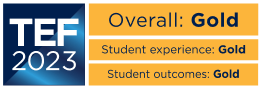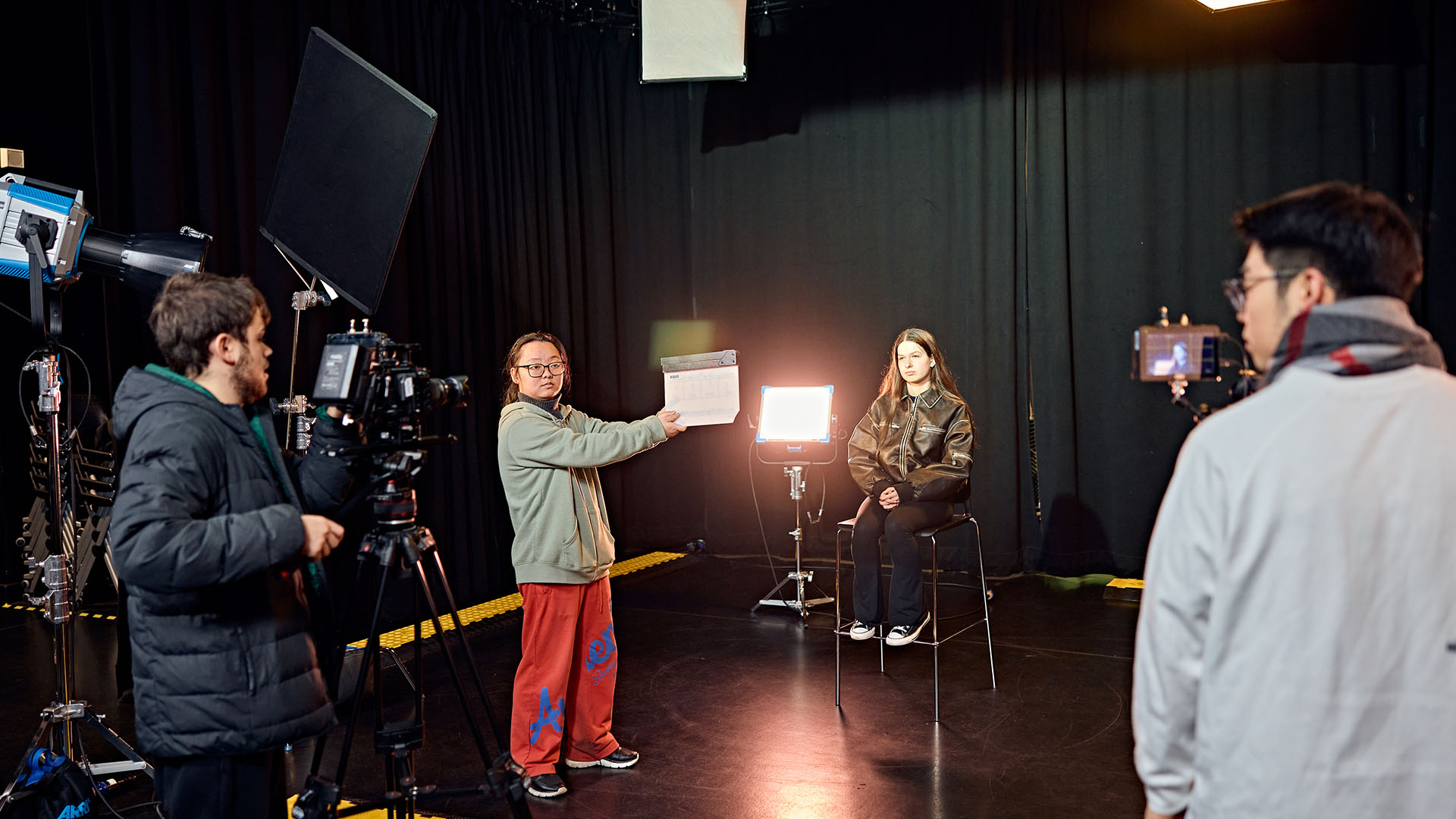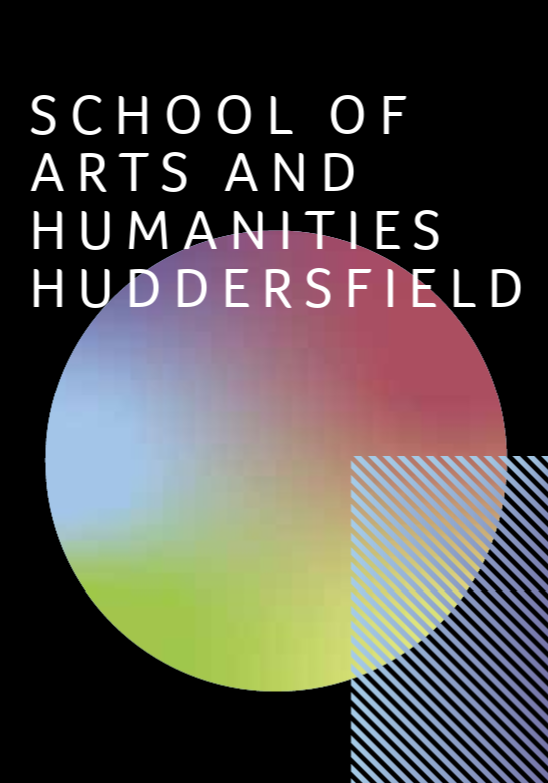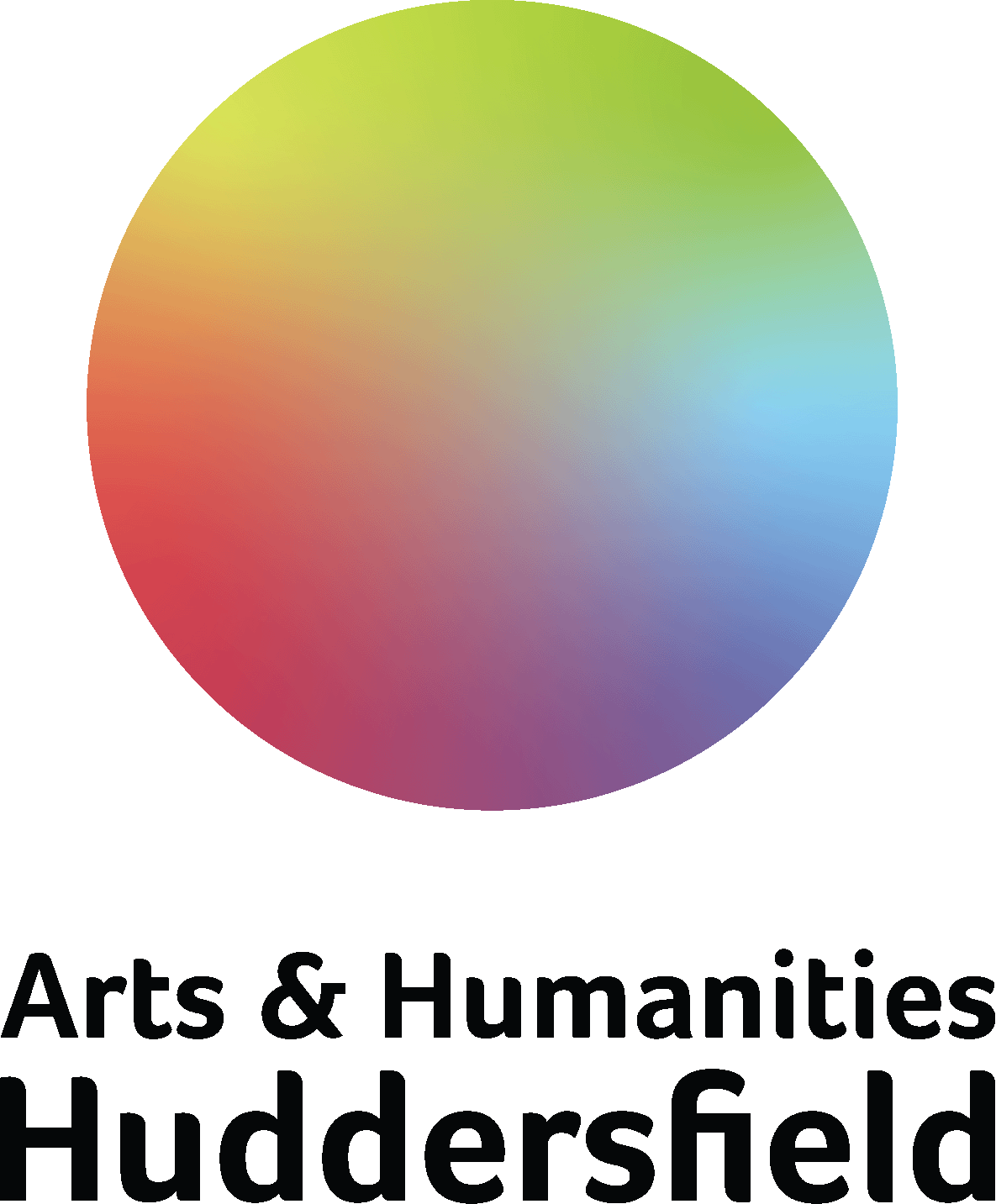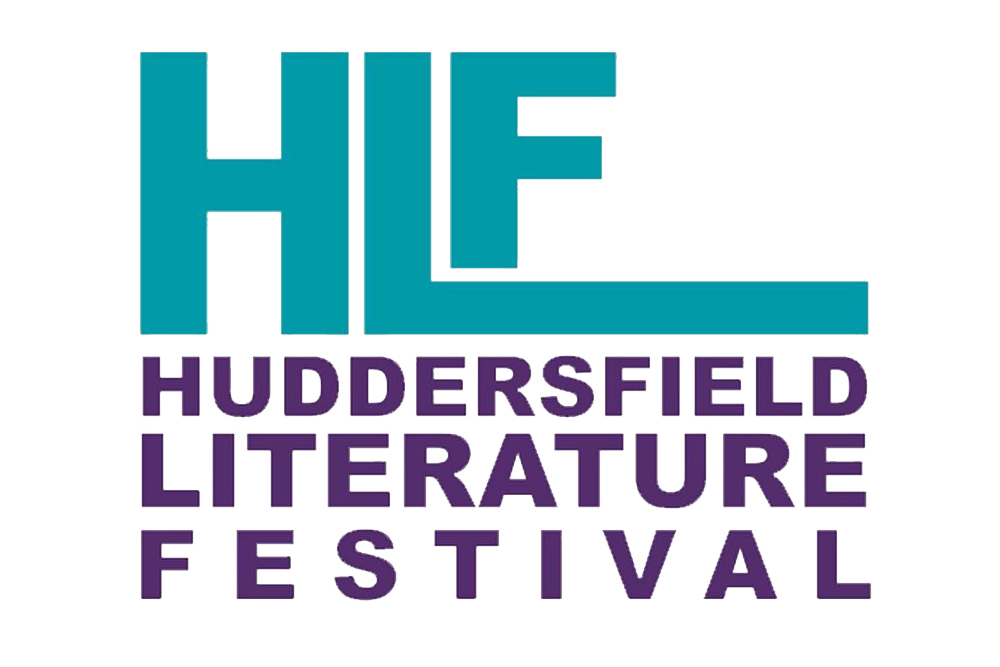
Film Studies and English Literature BA(Hons)
Start Dates
21 September 2026
Duration
3 years full-time 4 years inc. placement year
UCAS Tariff
112-104
Overview
Why choose Huddersfield for this course?
- Analyse, write, and create across literature and film, blending page and screen.
- Hands-on experience with industry-standard production facilities and projects.
- Build transferable skills for careers in media, publishing, and creative industries.
Explore the intersection of written and visual storytelling on our Film Studies and English Literature degree. You’ll analyse texts you love while learning how to craft stories for both the page and the screen.
Taught by internationally recognised professors, researchers, and media practitioners, you’ll benefit from hands-on experience in industry-standard production facilities within the Yorkshire Film and Television School. You’ll develop creative, technical, and analytical skills, including film analysis, screenwriting, video and audio production, and persuasive writing.
With English Literature, you’ll study a wide range of texts and genres, from contemporary poetry and experimental fiction to Victorian novels and Elizabethan drama. You’ll have opportunities to explore screenwriting, adapt literary works, and apply your skills in real-world projects.
Your learning will be enriched by field trips, placements, project work, and involvement in events like the Huddersfield Literature Festival. You’ll gain transferable skills that prepare you for careers in media, publishing, copywriting, editing, or film production.
This degree combines creative practice with academic insight, giving you the freedom to explore stories across literature and film while building a portfolio that reflects your unique voice.
Career opportunities after the course *
Digital Marketing Executive
Communications Officer
Marketing Executive
Fundraiser
*Lightcast
Entry Requirements
BBC-BCC at A Level.
112-104 UCAS tariff points from a combination of Level 3 qualifications.
Merit at T Level.
DMM-MMM in BTEC Level 3 Extended Diploma.
Merit in UAL Level 3 Extended Diploma.
Merit in RSL Level 3 Extended Diploma.
Access to Higher Education Diploma with 45 Level 3 credits at Merit or above.
112-104 UCAS tariff points from International Baccalaureate qualifications.
Applications from international students will be considered on an individual basis, and with advice from the University's International Office.
If your first language is not English, you will need to meet the minimum requirements of an English Language qualification. The minimum for IELTS is 6.0 overall with no element lower than 5.5, or equivalent. Read more about the University’s entry requirements for students outside of the UK on our International Entry Requirements page.
Other suitable experience or qualifications will be considered. For further information please see the University's minimum entry requirements.
Course Details
You will also choose 1 optional modules in this year. The current optional modules are:
For more information on when and how we update our modules please see the ‘Legal Information’ section below.
You will also choose 3 optional modules in this year. The current optional modules are:
For more information on when and how we update our modules please see the ‘Legal Information’ section below.
You will also choose 2 optional modules in this year. The current optional modules are:
For more information on when and how we update our modules please see the ‘Legal Information’ section below.
Teaching and Assessment
Discover what to expect from your tutor contact time, assessment methods, and feedback process.
Global Professional Award
At Huddersfield, you’ll study the award-winning Global Professional Award (GPA) alongside your degree* — so you’re ready for the career you want, whatever subject you choose.
Placements
This course offers the opportunity to complete a 5 week work placement which is an optional element of the second year of the course.
The course also offers an optional one-year (48 weeks) work placement after the second year, in the UK or abroad. This will give you the opportunity to gain valuable hands-on experience, insight into your chosen career and open up your graduate employment prospects.
Previous placement providers have included Pen and Sword Books, Oldham Evening Chronicle, Lotherton Hall, CHP Yorkshire, Rochdale Law Centre and a range of primary and secondary schools.
The most exciting part of my course is the opportunity to be creative. Film is a really fun subject which can be studied and applied in so many different ways.
- Alex Baron
Film Studies and English Literature BA(Hons)
Your Career
Media, creative and cultural sectors are one of the biggest and fastest growing in the UK. This degree will provide you with a combination of creative, technical and analytical skills for a variety of careers and roles in a rapidly developing digital economy.
75%-85%
Percent of graduates from these subject areas were in work or further study 15 months after graduation
* HESA Graduate Outcomes 22/23, UK Domiciled
The course wasn't just about watching films and History modules. We looked at many other areas of studies such as sociology, media, politics/geo-politics, advertising, philosophy and business. The variety of things that we learnt boosted my chances to adapt to any job scenario.
- Santa Nekrasova
Film Studies and English Literaure BA(Hons) graduate
Fees and Finance
This information is for Home students applying to study at the University of Huddersfield in the academic year 2026/27.
Please note that tuition fees for subsequent years may rise in line with inflation (RPI-X) and/or Government policy.
From January 2027 the UK government is launching a new student funding system for people starting university education. Read more about the Lifelong Learning Entitlement (LLE).
For detailed information please visit https://www.hud.ac.uk/study/fees/
This information is for international students applying to study at the University of Huddersfield in the academic year 2026/27.
Please note that tuition fees for subsequent years may rise in line with inflation (RPI-X) and/or Government policy.
For detailed information please visit https://www.hud.ac.uk/international/fees-and-funding/
Home
The tuition fee for a placement year is £1000. If you go on work experience or work placement, you will need to fund your own travel and/or accommodation costs to and from the placement. Please be aware that if your placement is outside of the UK, you will still be responsible for your travel and living expenses and may need to consider issues like health care and insurance costs.
International
The tuition fee for a placement year is £3,300. If you go on work experience or work placement, you will need to fund your own travel and/or accommodation costs to and from the placement. Please be aware that if your placement is outside of the UK, you will still be responsible for your travel and living expenses and may need to consider issues like health care and insurance costs.
Academic resources for your studies will be provided throughout the course, including access to library facilities and digital learning platforms. However, you will need to purchase certain set texts required for your modules. These texts are essential for seminar preparation and assessment.
The approximate costs for these purchases are:
• Year 1: £20-50
• Year 2: £20-50
• Year 3: £50-100
The actual amount may vary depending on whether you choose to buy new or second-hand books, or access digital editions where available. We will provide links to free electronic copies of texts wherever these are available.
Scholarships and Bursaries
Discover what additional help you may be eligible for to support your University studies.
Tuition Fee Loans
Find out more about tuition fee loans available to eligible undergraduate students.
What’s included in your fee?
We want you to understand exactly what your fees will cover and what additional costs you may need to budget for when you decide to become a student with us.
If you have any questions about Fees and Finance, please email the Student Finance Team.
Gallery
See below for a glimpse at some of our facilities
Explore More
Why Hud
Explore the unique opportunities and resources that make our institution a top choice for students seeking a well-rounded and future-focused education.
More Info
Careers support
We know you’re coming to university to study on your chosen subject, meet new people and broaden your horizons. However, we also help you to focus on life after you have graduated to ensure that your hard work pays off and you achieve your ambition.
Find out more about careers supportStudent support
At the University of Huddersfield, you’ll find support networks and services to help you get ahead in your studies and social life. Whether you study at undergraduate or postgraduate level, you’ll soon discover that you’re never far away from our dedicated staff and resources to help you to navigate through your personal student journey.
See our support servicesTeaching Excellence
Great teaching is engaging and inspiring — it helps you reach your full potential and prepares you for the future. We don’t just teach well — we excel — and we have the awards and recognition to prove it.
Find out moreInspiring Academics
Our researchers carry out world-leading work that makes a real difference to people’s lives. Staff within the Department of Media, Humanities and the Arts may teach you on this course.
Find out more about our staffResearch Excellence
You’ll be taught by staff who want to support your learning and share the latest knowledge and research.
Find out moreAccommodation
Looking for student accommodation? Huddersfield has you covered. HudLets has a variety of accommodation types to choose from, no matter what your preference. HudLets is the University’s approved accommodation service, run by Huddersfield Students’ Union.
Take a look at your optionsFurther Study
If you want to continue your learning beyond your undergraduate degree, there is a range of financial support available for postgraduate study, including discounts for Huddersfield graduates.
Discover postgraduate coursesLegal information
When you enrol as a student of the University, your study and time with us will be governed by our terms and conditions, Handbook of Regulations and associated policies. It is important that you familiarise yourself with these as you will be asked to agree to them when you join us as a student. You will find a guide to the key terms here, along with the Student Protection Plan.
Although we always try and ensure we deliver our courses as described, sometimes we may have to make changes for the following reasons:
Changes to a course you have applied for but are not yet enrolled on
If we propose to make a major change to a course that you are holding an offer for, then we will tell you as soon as possible so that you can decide whether to withdraw your application prior to enrolment. We may occasionally have to withdraw a course you have applied for or combine your programme with another programme if we consider this reasonably necessary to ensure a good student experience, for example if there are not enough applicants. Where this is the case we will notify you as soon as reasonably possible and if you are unhappy with the change we will discuss with you other suitable courses we can transfer your application to. If you do not wish to transfer to another course with us, you may cancel your application and we will refund you any deposits or fees you have paid to us.
Changes to your course after you enrol as a student
Changes to option modules
Where your course allows you to choose modules from a range of options, we will review these each year and change them to reflect the expertise of our staff, current trends in research and as a result of student feedback or demand for certain modules. We will always ensure that you have an equivalent range of options to that advertised for the course. We will let you know in good time the options available for you to choose for the following year.
Major changes
We will only make major changes to non-optional modules on a course if it is necessary for us to do so and provided such changes are reasonable. A major change is a change that substantially changes the outcomes, or a significant part of your course, such as the nature of the award or a substantial change to module content, teaching days (part time provision), type of delivery or assessment of the core curriculum. For example, it may be necessary to make a major change to reflect changes in the law or the requirements of the University’s regulators or a commissioning or accrediting body. We may also make changes to improve the course in response to student, examiners’ or other course evaluators’ feedback or to ensure you are being taught current best practice. Major changes may also be necessary because of circumstances outside our reasonable control, such as a key member of staff being unable to teach due to illness, where they have a particular specialism that can’t be adequately covered by other members of staff; or due to pandemics, other disasters (such as fire, flood or war) or changes made by the government.
Major changes would usually be made with effect from the next academic year, but may happen sooner in an emergency. We will notify you as soon as possible should we need to make a major change and will consult with affected groups of students and any changes would only be made in accordance with our regulations. If you reasonably believe that the proposed change will cause you detriment or hardship we will, if appropriate, work with you to try to reduce the adverse effect on you or find an appropriate solution. Where an appropriate solution cannot be found and you let us know before the change takes effect you can cancel your registration and withdraw from the University without liability to the University for any additional tuition fees. We will provide reasonable support to assist you with transferring to another university if you wish to do so and you may be eligible for an exit award depending on how far through your course you are.
In exceptional circumstances, we may, for reasons outside of our control, be forced to discontinue or suspend your course. Where this is the case, a formal exit strategy will be followed in accordance with the student protection plan.
The Office for Students (OfS) is the principal regulator for the University.
